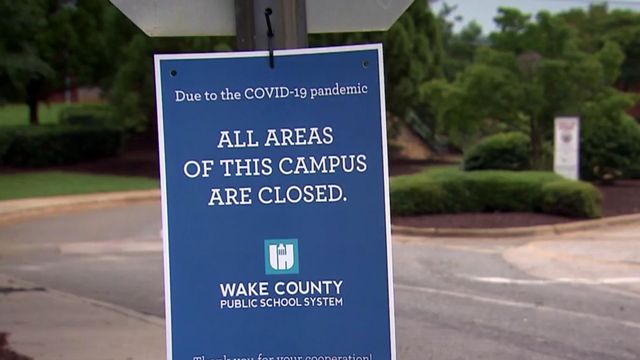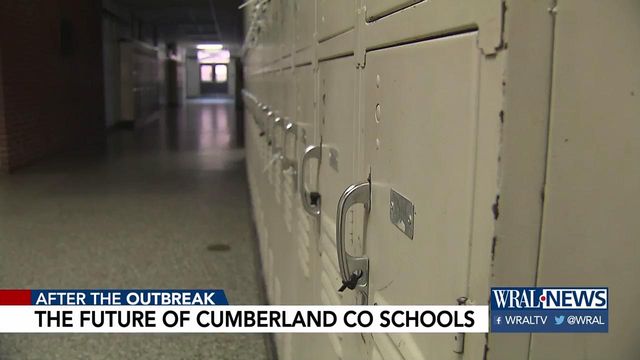Parents, school leaders grow impatient for state plan to resume classes
Gov. Roy Cooper said Wednesday that he would announce details by the middle of July for returning students to public school classrooms next month, despite the ongoing coronavirus pandemic.
Posted — UpdatedCooper had been expected to provide that information on Wednesday, and the delay leaves school districts and parents across North Carolina anxious for guidance as the start date for the 2020-21 school year approaches.
"I am a little concerned how they are going to open it back up, if they are going to open it back up," parent Kima Wright said. "I am a little concerned with what they are going to do, how they are going to do it, you know, because kids, especially young kids, are not really safe when it comes to washing hands and things like that."
Cooper said his top priority, as many North Carolina businesses remain closed by state order to limit the spread of coronavirus, is to get students back to school. So, he said, officials want "a little more time" to make sure their plans don't cause a spike in coronavirus cases.
"We want to get our students back in the classroom, and we want to make sure that we get this right," Cooper said at a news conference. "[We] know a lot more than we did in March when we closed the schools. We know a lot more about this virus – how to live with it, how to deal with it."
For example, Dr. Mandy Cohen, secretary of the state Department of Health and Human Services, said recent research shows schools haven't played a major role in the spread of the virus globally. Children are less likely to be infected, and they are less likely to infect others, she said.
"This is critical because decisions to open schools cannot just be about the children but also must consider the health and well-being of our educators," Cohen said.
State officials also are stockpiling a two-month supply of masks, gowns and other protective gear at each public school in advance of classes, Emergency Management Director Mike Sprayberry said Wednesday.
“It is difficult when things keep moving and circumstances keep changing," Wake County Board of Education Chairman Keith Sutton said. "We want to make sure we have a plan we can implement and we can implement successfully, and that is our biggest concern."
The school board plans to meet again Thursday to continue hammering out details, but Sutton said it likely will be a hybrid model of in-person and online learning.
"Most signs point toward some sort of scenario around Plan B," he said.
Durham Public Schools has already adopted plans to have high school students continue with online learning this fall, freeing up that space for elementary and middle school students to be in class full time and spread out more for social distancing. The district also is launching an online academy for students and staff unable to participate in in-person instruction due to health concerns.
Meanwhile, Sampson County Schools has approved a model in which half of the students at each school would be in class on Mondays and Tuesdays and the other half on Thursdays and Fridays. Students would learn from home the three days they aren't at school, and teachers would have Wednesdays for planning, grading and preparing specific information for remote learning.
Cooper urged schools that start before August begin solely with online instruction until the state guidelines are in place.
Poll: NC split on how to restart school
North Carolina residents are fairly evenly split on how classes should be conducted this fall, according to a new Elon University Poll.
Elon surveyed 1,410 people on June 24-25 and found that 38 percent prefer the hybrid approach, 34 percent favor returning to school completely and 29 percent want students to continue learning remotely.
"That all three broad approaches for reopening K-12 schools have similar levels of support is a testament to the uncertainty, complexity and difficulty of the decision," Jason Husser, director of the Elon Poll and associate professor of political science and policy studies, said in a statement.
Surprisingly, political affiliation was a greater indicator of how someone feels about moving forward than whether the respondent has a child or grandchild in school.
Forty-six percent of Republicans are in favor of a full-time return to school, compared with 23 percent of Democrats and 31 percent of unaffiliated or third-party residents. Forty percent of both Democrats and those belonging to neither party prefer the hybrid approach, compared with 33 percent of Republicans. Continuing with remote learning was favored by 36 percent of Democrats, 29 percent of those belonging to neither party and 21 percent of Republicans.
Also, men were generally more in favor of a full-time return to the classroom, while the top choice for women was a part-time return to the classroom. White respondents were generally more in favor of a full-time return to the classroom than those who are Black or of another race.
"No matter how you slice up the data, North Carolinians are divided about what to do with K-12 students this fall," Kaye Usry, assistant director of the Elon Poll and assistant professor of political science and policy studies, said in a statement.
"Even if they do the half and half so they are not, you know, contacting with each other," she said. "Their immune system is a lot stronger than ours."
Related Topics
• Credits
Copyright 2024 by Capitol Broadcasting Company. All rights reserved. This material may not be published, broadcast, rewritten or redistributed.






